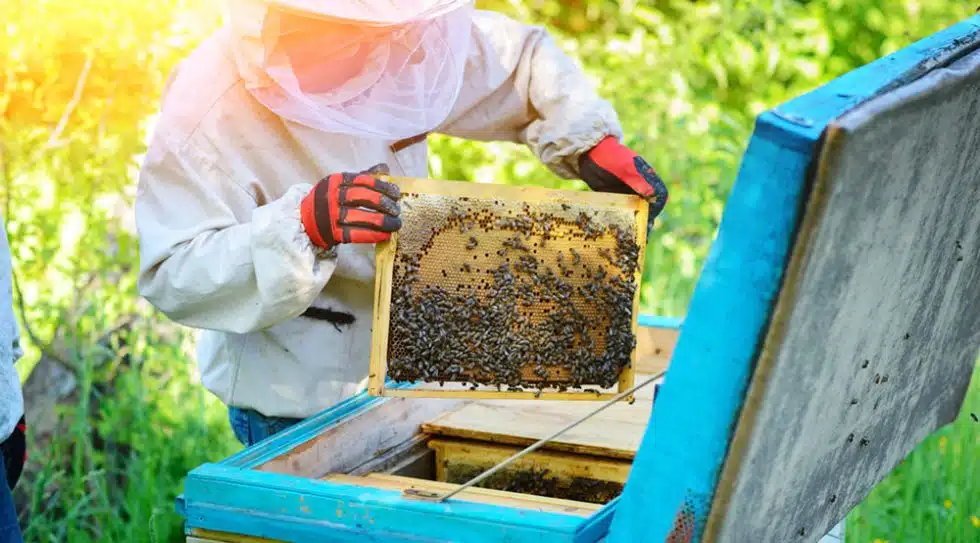A few years ago, I took up beekeeping. I made a small investment in a beehive, veil, Kevlar suit, and leather gloves to avoid the pain and agony of the occasional bee sting. Sounds similar to the financial meltdown and great recession of 2008-2009 right? Have you ever wondered what investing and beekeeping have in common? On the surface, they might not seem to have much in common, but upon closer examination, there are some surprising similarities.
Just like bees, investors must be diligent and hardworking to achieve success. Bees spend their days gathering nectar and pollen to bring back to the hive, tirelessly working to ensure the survival of their colony. Similarly, investors must be constantly on the lookout for new opportunities, researching and analyzing potential investments to make informed decisions.
Another similarity is the importance of having a well-structured plan. Bees have a highly organized society, with each bee having a specific role to play in the functioning of the hive. Similarly, investors must have a well-thought-out strategy in place, setting specific goals and deciding on the best course of action to achieve those goals.
However, there are also differences between bees and investing. For example, while bees rely on their instincts and natural abilities to gather resources, investors must have a solid understanding of the market and the economy to make informed decisions. Additionally, while a bee’s success is largely dependent on the health of its colony and the surrounding environment, an investor’s success is determined by a wide range of factors, including the knowledge and experience of their financial advisor, individual skills, market conditions, and the performance of their investments.
Long-Term Survival Strategies
Just like the stock market, bee colonies can experience both highs and lows. Drought can be thought of as an investment downturn for bees, as it reduces the availability of their primary resource, nectar. A prolonged drought can cause the death of the colony if there is not enough food to sustain the bees.
Similarly, in the stock market, a prolonged period of poor performance can lead to decreased returns and potentially even losses for investors. In both cases, preparation and contingency planning can be the key to ensuring long-term survival.
For bees, this means having a diverse and plentiful forage area to increase their chances of finding food even during times of drought. Similarly, for investors, it means having a well-diversified portfolio and considering the potential risks of each investment, so that they are not overly reliant on any one stock or sector.
Another strategy for both bees and investors is to take a long-term approach. While the stock market may experience ups and downs in the short-term, over a longer period of time, it has historically tended to increase in value. In the same way, bees can survive a drought if they have a large enough colony, adequate food stores, and healthy genetics.
Honey Harvesting and Interest Income
Professional beekeepers understand the importance of balancing their needs with those of the bees, and they only take a portion of the honey each year, leaving enough for the colony to thrive. This approach ensures that the colony will continue to produce honey in the future and provides a sustainable source of income for the beekeeper.
Similarly, in investing, it is common to use interest earned from investments to provide a steady stream of income, rather than depleting the entire principal. This approach, known as “living off the interest,” allows investors to maintain the value of their investments over time and provides a stable source of income.
However, just as taking too much honey can harm the colony, taking too much interest from investments can deplete the principal and lead to decreased returns in the future. Both beekeepers and investors must find the right balance between taking what they need and preserving the resources for the long-term.
Finally, the practice of taking only a portion of the honey in beekeeping and using interest from investments as a source of income are similar in that they both involve balancing the needs of the present with those of the future. By being mindful of the long-term impacts of their actions, both beekeepers and investors can ensure the sustainability of their resources and their own financial well-being.
Bee Colonies and Markets Both Under Pressure
In conclusion, both bee colonies and the stock market can be vulnerable to environmental pressures. Whether it’s drought for bees or economic conditions for the stock market, changes in the environment can have a significant impact on their success and survival.
However, with careful planning and preparation, both bee colonies and investors can weather these challenges and come out even stronger on the other side. By diversifying their resources, taking a long-term approach, and being mindful of their actions, beekeepers and investors can increase their chances of success and ensure their own long-term survival.
Just like bee colonies, the stock market is complex and dynamic, and it requires a deep understanding and careful consideration to achieve success. By learning from the strategies of successful beekeepers and investors, we can gain insights into how to navigate the ups and downs of life and achieve our own goals, both personally and financially.
So, the next time you admire a buzzing hive or make a financial investment, take a moment to reflect on the similarities and differences between these two seemingly disparate pursuits.
Who knows? Just like me, you may just discover a newfound appreciation for both!
Helping You Build a Firm Financial Foundation For Your Future
Nico F. March is the Managing Director for The March Group, LLC. He has worked with Community Associations since 1974 and has served on several Boards, including the Board of Directors for the Community Association Institute (CAI), San Diego Chapter. His team has specialized in Corporate Cash and Association Financial Management since 1982 and has assisted over 1000 Associations, Nonprofits and Timeshares invest over $4 Billion in reserve, operating and reconstruction funds. Nico and his team work out of their San Diego and Wyoming offices and may be reached at 888.811.6501 or email [email protected] for further information and consultations.
The March Group is not a tax or legal advisor. We will be glad to work with your professional CPA and Attorney to help you with your financial goals. Neither the information contained herein nor any opinion expressed shall be construed to constitute an offer to sell or a solicitation to buy any securities mentioned herein. Nico March is a registered representative with, and securities are offered through LPL Financial, Member FINRA/SIPC.
The opinions voiced in this material are for general information only and are not intended to provide specific advice or recommendations for any individual or organization.
LPL APP 414737-1



